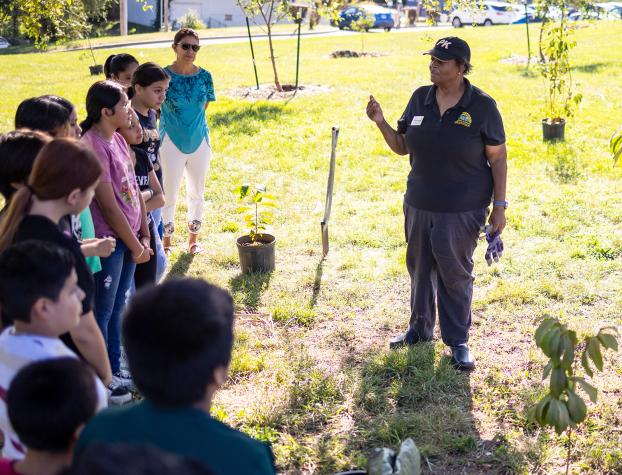KANSAS CITY, Mo. – University of Missouri Extension Master Gardener Toni Gatlin can’t change genetics, but she hopes to change the eating habits of children to help prevent diabetes.
About 37 million Americans – around 11% of the U.S. population – have diabetes, according to the Centers for Disease Control and Prevention. Health problems linked to diabetes affect the eyes, kidneys, heart and nerves, says MU Extension health and safety specialist Karen Funkenbusch.
Gatlin knows the affects all too well. Many of her family members have health issues caused by diabetes, including amputations, blindness, and kidney problems requiring dialysis. Her mother developed diabetes at 36 and died at 57 from complications of the disease.
Gatlin’s lifelong work has been to promote healthy eating to help prevent disease. She is one of the original 10 members of Kansas City Black Urban Growers (KCBUGS), a nonprofit dedicated to promoting Black agrarianism and advocating for an equitable Kansas City food system.
She also works with Kansas City youths using Eating From the Garden, a research-based MU Extension nutrition and gardening program for fourth- and fifth-grade students.
Master Gardener groups like Gatlin’s Urban Dreams Team work with students to grow fruits and vegetables in gardens and orchards at elementary schools where more than 90% of the students are minority and 99% live below the federal poverty level.
Both factors put these students at greater risk of developing diabetes, according to the CDC. While certain racial and ethnic groups are at a higher risk of developing diabetes, lifestyle and diet also play critical roles, says Gatlin.
Gatlin hopes to lower the odds students developing diabetes by teaching them to grow and eat foods in the schoolyard’s raised beds and orchards. She also encourages them to exercise and be active.
Gatlin challenges other Master Gardeners to choose schoolyard gardens and orchards for earning volunteer hours required for Master Gardener certification. She also finds it rewarding to work with partners from the Missouri Department of Conservation to plant native fruit and nut trees in schoolyards. Her goal is to replace schoolyard asphalt with pollinators, gardens and trees.
She introduces students to eating raw fruits and vegetables, which students grew themselves, without fatty dips or seasonings. “I want them to enjoy the flavor of fresh fruits and vegetables while they’re young. This sets them up to develop good habits for better health for the rest of their life,” she says. She also encourages them to take food home to share.
Tamra Reall, horticulture specialist and coordinator for the MU Extension Master Gardener program in Kansas City, says, “Learning about growing food and being healthy is crucial, as it instills valuable life skills, promotes a deeper understanding of nutrition and encourages a lifelong commitment to a healthier lifestyle.”
Learn more about the MU Extension Master Gardeners of Greater Kansas City.
Photo
Toni Gatlin
University of Missouri Extension Master Gardener Toni Gatlin works in Kansas City schoolyards to plant fruit and nut trees and vegetables to teach children about the importance of eating healthy and keeping active. Photo by Brandon Parigo, University of Missouri-Kansas City.
